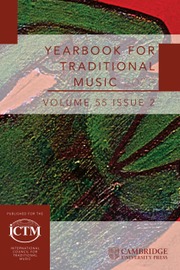No CrossRef data available.
Article contents
The Significance of Ìrìráábú Musical Satire in the Ékpè Dance Festival Amongst the Obohia-Ndoki People of Nigeria
Published online by Cambridge University Press: 18 January 2019
Extract
Ékpè can be understood as a spirit-manifest or masquerade as well as a festival, and Ìrìráábú is a part of the music performed during the Ékpè dance festival. The Ékpè dance festival is part of my cultural heritage—I am part of this culture and have been an active participant-observer in this festival since my childhood.
- Type
- Articles
- Information
- Copyright
- Copyright © 2018 by the International Council for Traditional Music
References
References Cited
Agawu, Kofi. 2016. The African Imagination in Music. New York: Oxford University Press.CrossRefGoogle Scholar
Akpabot, Samuel. 1986. Foundation of Nigerian Traditional Music. Ibadan, Nigeria: Spectrum Books Limited.Google Scholar
Ekwueme, Lazarus. 2017. “Music in Nigeria's Social Development: A Step Forward.” In Music and Social Dynamics in Nigeria, ed. Bode, Omojola, Vol.3:9–21. New York: Peter Lang Publishing, Incorporated.Google Scholar
Grout, Donald, and Palisca, Claude. 1988. A History of Western Music. London: J. M. Dent & Sons Limited.Google Scholar
Nketia, J. H. Kwabena. 2005. “Thinking about Music in Ethnomusicological Terms.” In Ethnomusicology and African Music: Modes of Inquiry and Interpretation (Collected Papers, Vol.1), 1–20. Accra, Ghana: Afram Publications.Google Scholar
Nwankpa, Onyee. 1994. “The Reconciliation Symphony.” PhD Dissertation, University of Calgary at Alberta.Google Scholar
Nwankpa, Onyee. 2013. Community Music Programme. Port Harcourt, Nigeria: Celwil Publishers Nigeria Limited.Google Scholar
Nwankpa, Onyee. 2014. “Pass over Pedantry: Contesting the State of Musical Arts in Nigeria.” Nsukka Journal of Musical Arts Research 3:1–12.Google Scholar
Nzewi, Meki. 2006. Okeke Music, Myth and Life: An African Story. Pretoria: Unisa Press, University of South Africa.Google Scholar
Okafor, Richard. 2005a. “Traditional Music as a Vehicle of Local Identity.” In Music in Nigerian Society, 87–115. Enugu, Nigeria: New Generation Books.Google Scholar
Okafor, Richard. 2005b. “Minstrelsy in Ezeagu Local Government Area: Onu-Okwa: ‘The Voice of the Partridge.’” In Music in Nigerian Society, 116–125. Enugu, Nigeria: New Generation Books.Google Scholar
Okafor, Richard. 2005c. “Igbo Musical Calendar.” In Music in Nigerian Society, 126–158. Enugu, Nigeria: New Generation Books.Google Scholar
Omojola, Bode. 2017. “Introduction: Perspectives on Music and Social Dynamics in Nigeria.” In Music and Social Dynamics in Nigeria, ed. Omojola Bode, Vol. 3, 1–55. New York: Peter Lang Publishing, Incorporated.Google Scholar
Onyeji, Christian. 2016. Composing Art Music Based on Indigenous Paradigms. Enugu, Nigeria: University of Nigeria Printing Press.Google Scholar


